What Is Bad Link Building? How to Avoid Common Link-Building Mistakes
Aug 26, 2024
Written by Casey Bjorkdahl

Casey Bjorkdahl is one of the pioneering thought leaders in the SEO community. In 2010, Casey co-founded Vazoola after working for a Digital Marketing Agency for five years in New York City. Vazoola is now one of the fastest growing and most widely recognized SEO marketing firms in the country.
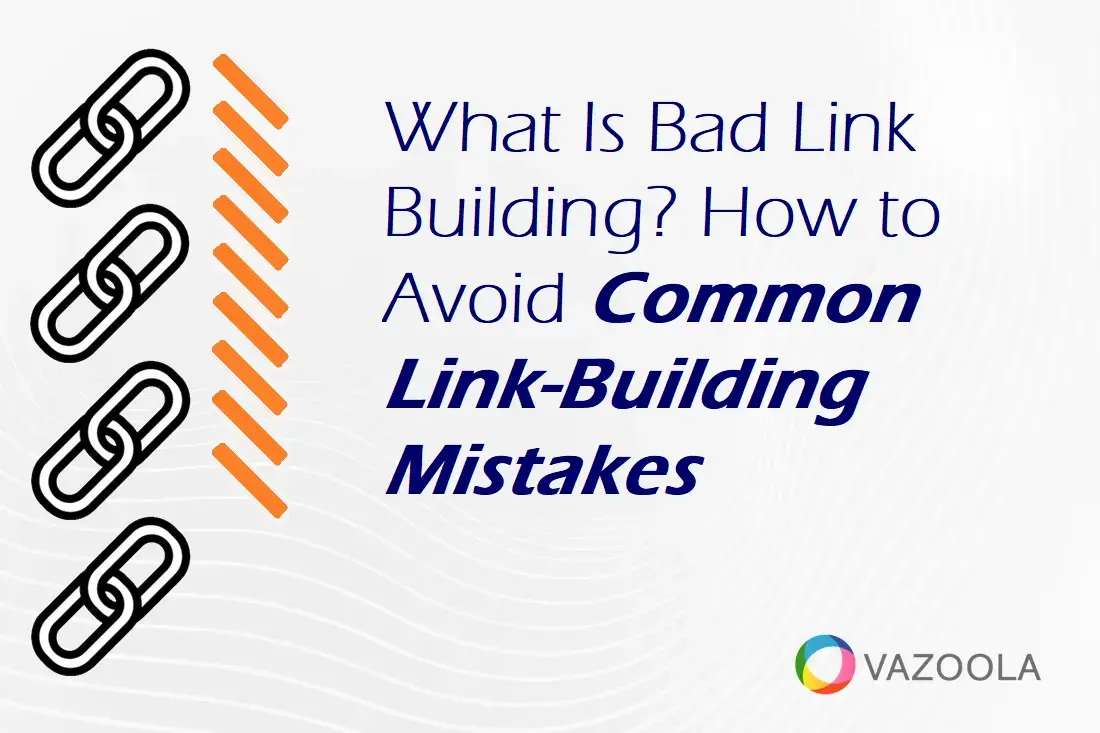
What is bad link building? To understand – and avoid – this common mistake, you first should understand the link-building process and its importance to search engine optimization.
Still, even that knowledge doesn’t mean you won’t fall into some common pitfalls that undermine your link-building efforts.
Fortunately, it’s completely possible to avoid some of the most common link-building mistakes. If you’re looking for practical solutions that will make your link-building campaigns safe and effective, keep reading as we break it all down.
Key Takeaways:
-
High-quality backlinks from reputable sources improve search rankings and drive organic traffic. Low-quality links can harm your SEO efforts.
-
You should focus on the quality of backlinks rather than their quantity because search engines prioritize valuable links over numerous low-quality ones.
-
Spammy link-building tactics like using Private Blog Networks and excessive link exchanges can lead to severe penalties from search engines.
-
An over-reliance on third-party metrics like Domain Authority can be misleading; relevance and contextual fit are more critical factors for choosing link sources.
-
Acquiring links from relevant websites within your niche boosts the value of your backlinks. However, links from low-quality or unrelated sites can negatively impact your SEO.
-
Use varied and natural anchor text best practices to prevent search engine penalties and improve the efficacy of your link-building strategy.
-
Neglecting internal linking can undermine your SEO efforts. Internal links distribute link equity, improve site navigation, and enhance user experience.
Table of Contents:
The Importance of Link Building for SEO
What is link building, and why does it matter?
The process occurs when you acquire hyperlinks from other websites that point to your own website. These valuable links serve as endorsements that help search engines like Google understand your site’s authority and relevance.
What exactly do backlinks do for your SEO?
High-quality backlinks from reputable sources can boost your website's authority. They also improve its search rankings and drive organic traffic.
On the other hand, poor link-building practices can lead to penalties and a drop in search rankings. A strategic approach, therefore, is needed for success.
Think of backlinks as votes of confidence. When other reputable sites link to yours, the new backlink tells search engines your content is valuable and trustworthy. That recognition can lead to higher search engine rankings. It also results in increased visibility, and more organic traffic.
Don't forget, however, that not all links are created equal. It’s crucial to understand the difference between beneficial and harmful links.
Common Link-Building Mistakes to Avoid
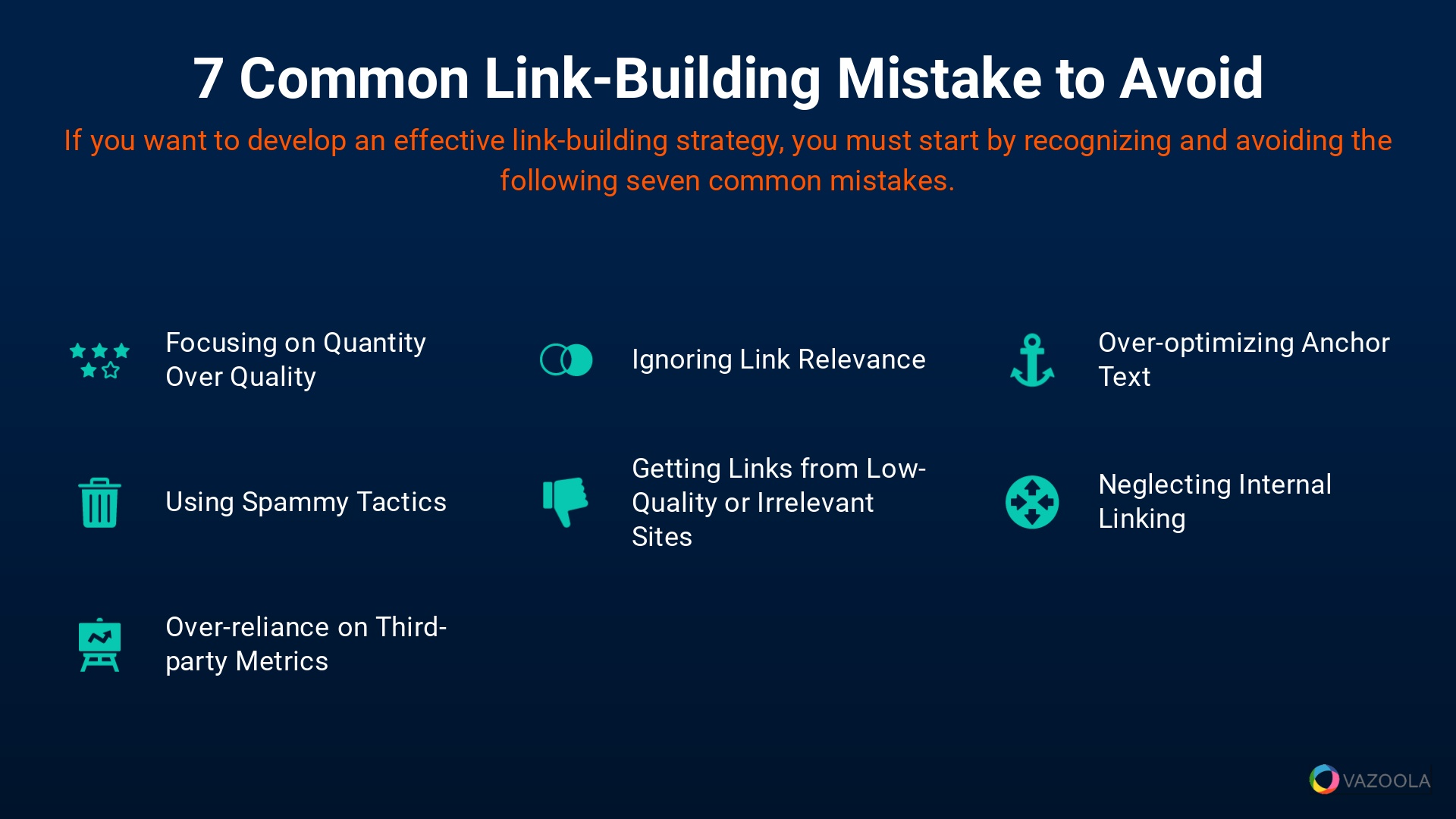
If you want to develop an effective link-building strategy, you must start by recognizing and avoiding the following seven common mistakes.
Mistake 1: Focusing on Quantity Over Quality
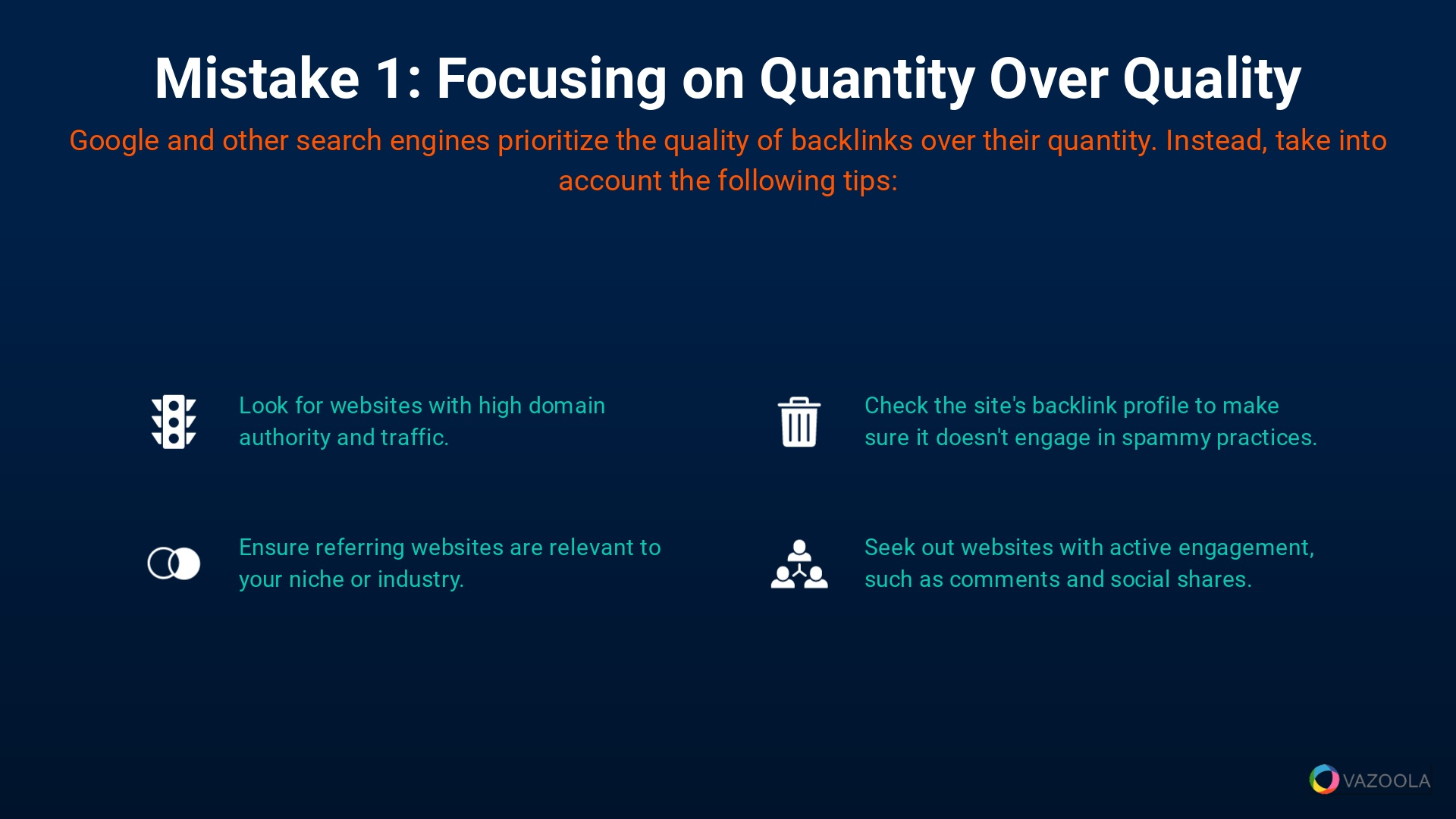
One prevalent misconception about link building is that quickly acquiring a large number of backlinks will improve search rankings. The truth is search engines are smarter than many give them credit.
Google and other search engines prioritize the quality of backlinks over their quantity.
What does that mean?
A few high-quality links from authoritative sources can significantly impact your SEO positively. Too many low-quality links, on the other hand, can be detrimental. Make sure your backlink profile naturally grows without sudden, unnatural spikes in link acquisition.
But what kind of links are considered “quality”?
Quality backlinks come from websites that are authoritative and relevant. They also boast high engagement. Links from quality sites are more valuable because they are more likely to drive traffic and improve search engine rankings.
Meanwhile, low-quality links – often from spammy or unrelated sites – can harm your SEO efforts. They can result in penalties from search engines – which can drastically affect your rankings in the wrong direction.
Still unsure how to identify high-quality link opportunities? Remember the following tips:
-
Look for websites with high domain authority and traffic.
-
Ensure referring websites are relevant to your niche or industry.
-
Check the site's backlink profile to make sure it doesn't engage in spammy practices.
-
Seek websites with active engagement, such as comments and social shares.
Mistake 2: Using Spammy Tactics
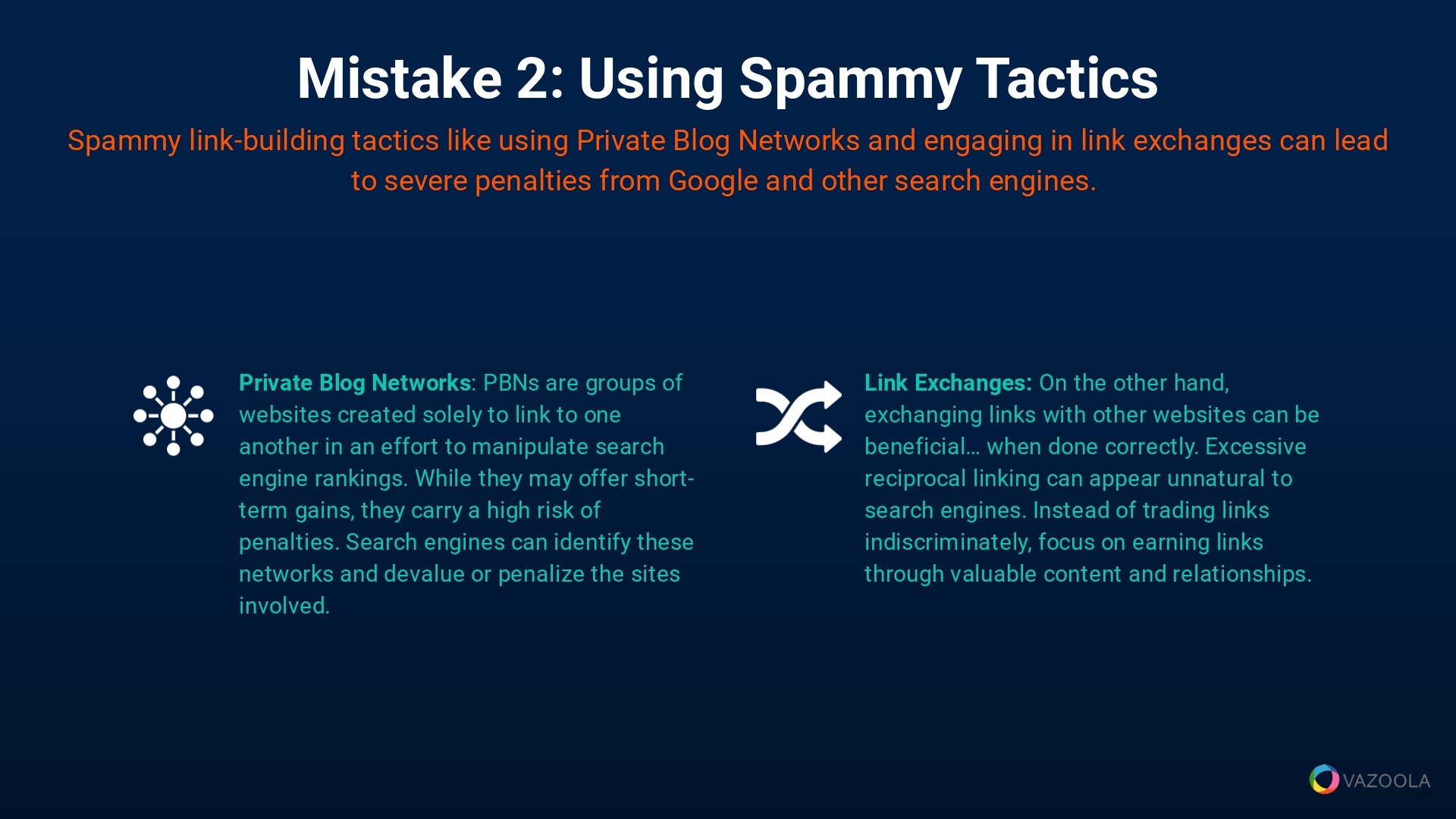
Spammy tactics can spell doom for an SEO strategy. But what are they?
Spammy link-building tactics like using Private Blog Networks and engaging in link exchanges can lead to severe penalties from Google and other search engines.
So, what are PBN backlinks and link exchanges, and exactly what is Google’s issue with them?
-
Private Blogging Networks: PBNs, also known as link farms, are groups of websites created solely to link to one another in an effort to manipulate search engine rankings. While they may offer short-term gains, they carry a high risk of penalties. Search engines are smarter than some might give them credit, and they can identify these networks and devalue or penalize the sites involved.
-
Link Exchanges: On the other hand, exchanging links with other websites can be beneficial… when done correctly. Excessive reciprocal linking can appear unnatural to search engines. Instead of trading links indiscriminately, focus on earning links through valuable content and relationships.
Mistake 3: Over-Reliance on Third-Party Metrics
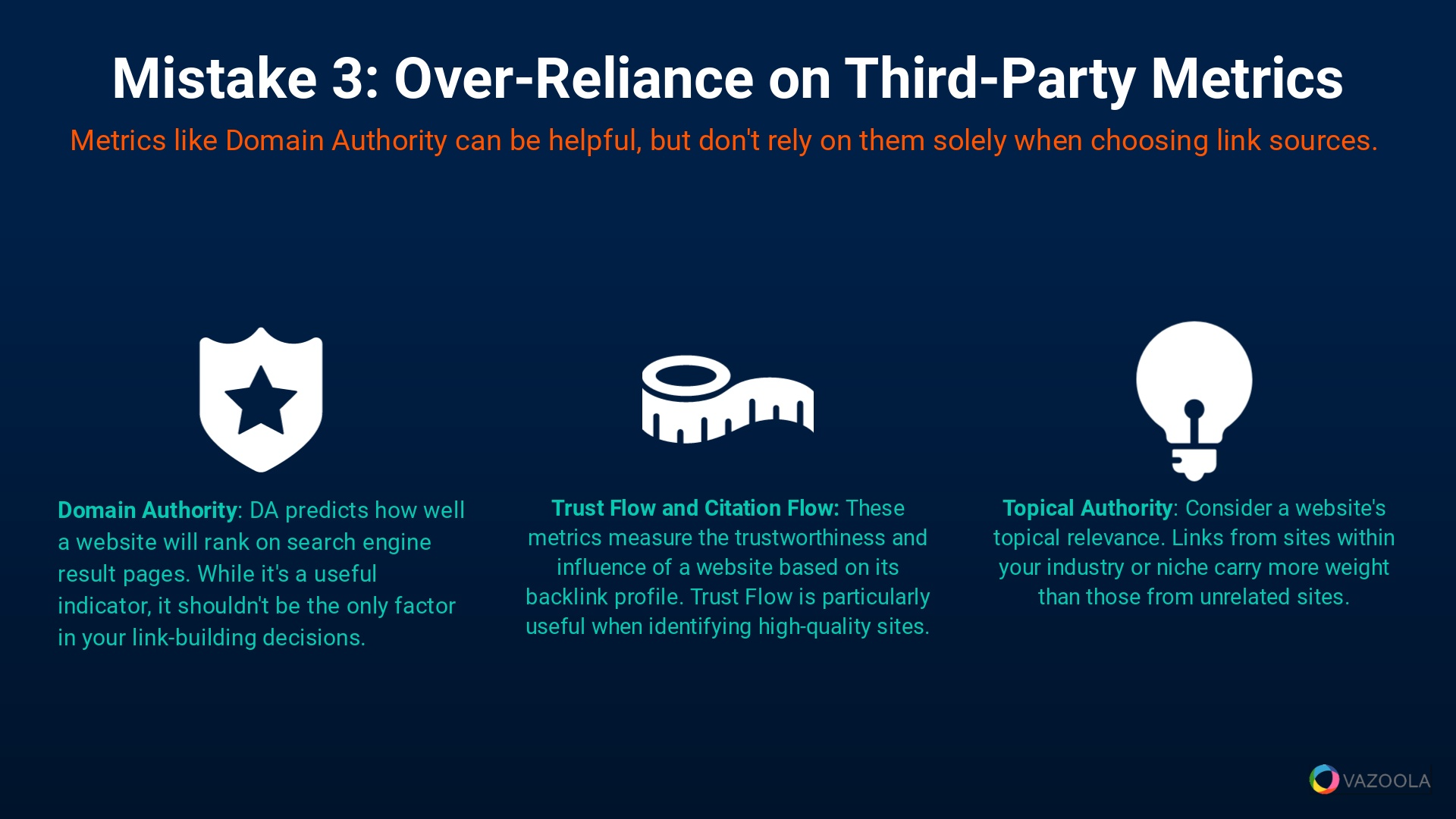
Metrics like Domain Authority can be helpful, but don't rely on them solely when choosing link sources. Is domain authority important? Is domain authority a ranking factor?
Sure, DA provides insights into a site's overall authority. Still, relevance and contextual fit are more critical factors. Alternative metrics like Trust Flow, Citation Flow, or topical authority can also provide a well-rounded picture of a website's quality.
What are these website measures, and how can you use them to determine quality? We’ve got the scoop:
-
Domain Authority: Developed by Moz, DA predicts how well a website will rank on search engine result pages. While it's a useful indicator, it shouldn't be the only factor in your link-building decisions. High DA doesn't always mean high relevance, after all.
-
Trust Flow and Citation Flow: These metrics, developed by Majestic, measure the trustworthiness and influence of a website based on its backlink profile. Trust Flow is particularly useful when identifying high-quality sites.
-
Topical Authority: Consider the topical relevance of a website. Links from sites within your industry or niche backlinks carry more weight than those from unrelated sites. Search engines prioritize relevance, so make sure you focus on earning links from authoritative sources within your field.
Pro Tips:
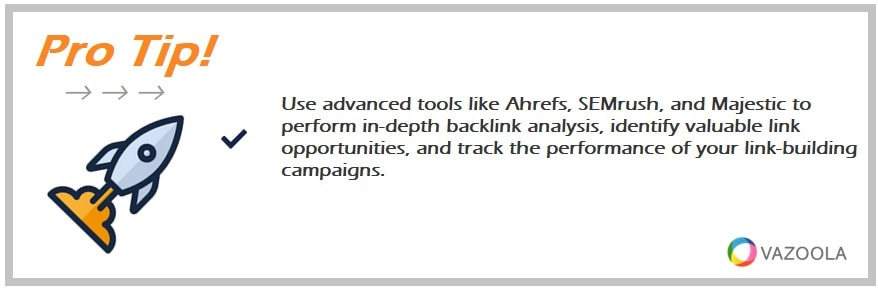
Use advanced tools like Ahrefs, SEMrush, and Majestic to perform in-depth backlink analysis, identify valuable link opportunities, and track the performance of your link-building campaigns.
Mistake 4: Ignoring Link Relevance
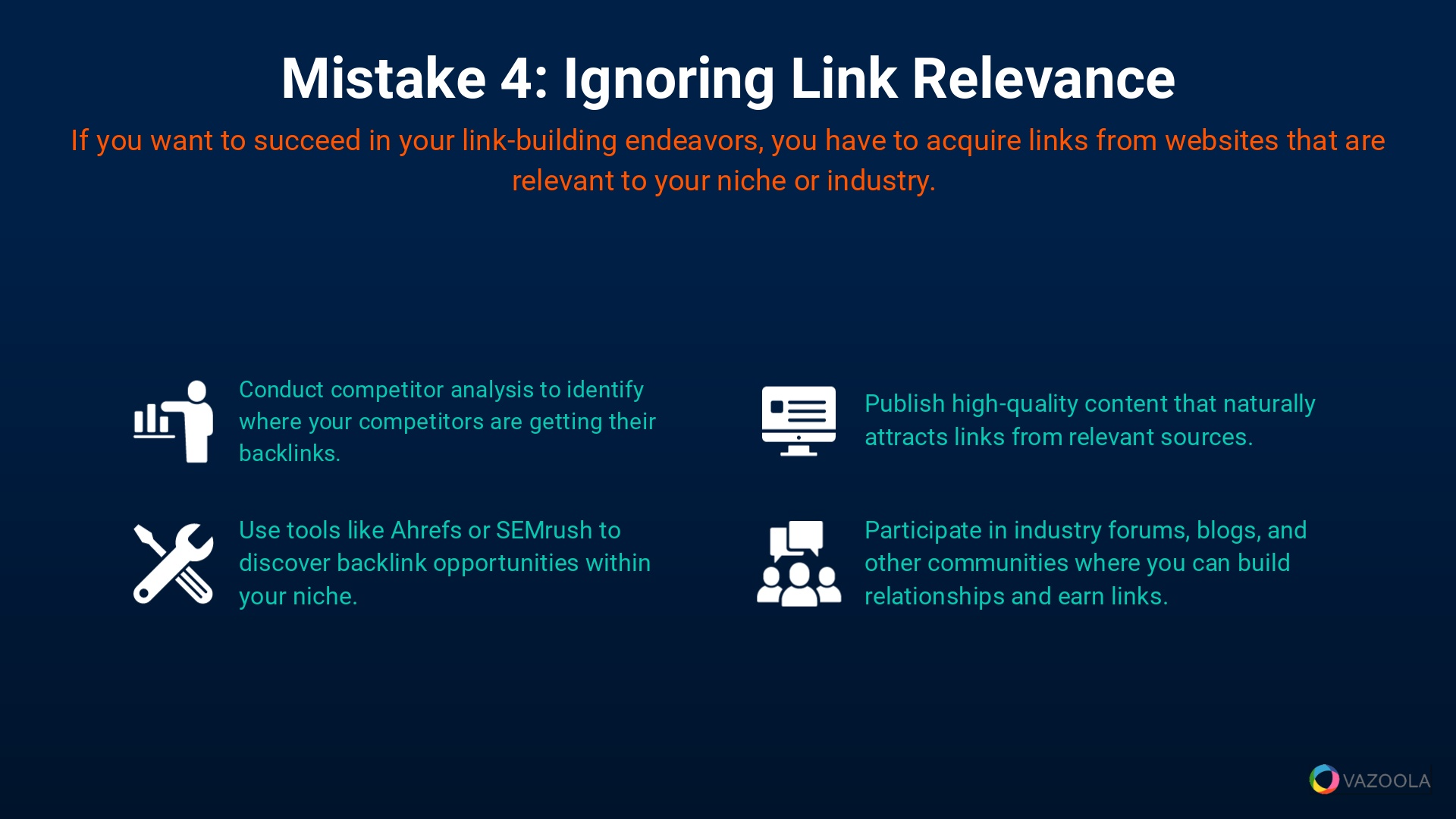
If you want to succeed in your link-building endeavors, you have to acquire links from websites that are relevant to your niche or industry.
When backlinks are relevant to your own content, they offer significant value. That means they’re viewed favorably by search engines. Focus on finding link opportunities within your industry to maintain a natural and effective link profile.
Consider using the following strategies when seeking relevant link opportunities:
-
Conduct competitor analysis to identify where your competitors are getting their backlinks.
-
Use tools like Ahrefs or SEMrush to discover backlink opportunities within your niche.
-
Publish high-quality content that naturally attracts links from relevant sources.
-
Participate in industry forums, guest blogs, and other communities where you can build relationships and earn links.
Pro Tips:
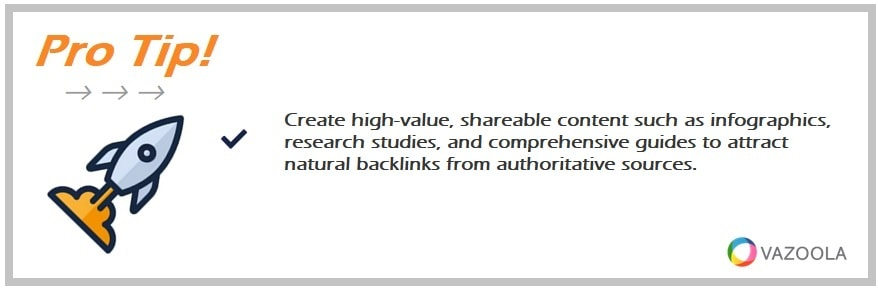
Create high-value, shareable content such as infographics, research studies, and comprehensive guides to attract natural backlinks from authoritative sources.
Mistake 5: Getting Links from Low-Quality or Irrelevant Sites
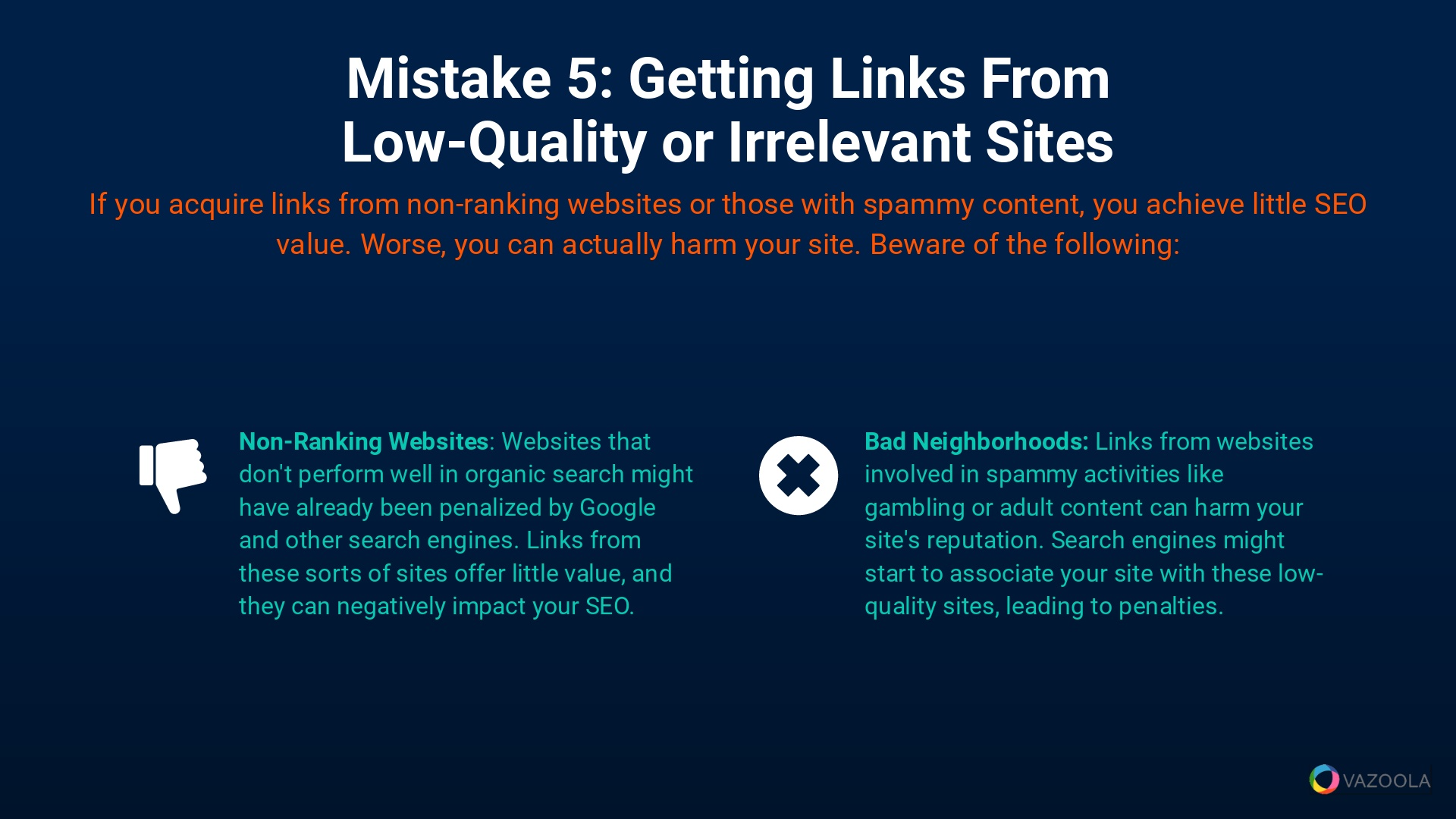
If you acquire links from non-ranking websites or those with spammy content, you achieve little SEO value. Worse, you can actually harm your site.
Always make sure you avoid links from sites associated with gambling, adult content, or other spammy niches. You would hate for your site’s reputation to be associated with taboo activities.
Always vet potential link sources to ensure they meet quality standards.
In particular, stay aware of the following low-quality sites and avoid obtaining links from them:
-
Non-Ranking Websites: Websites that don't perform well in organic search might have already been penalized by Google and other search engines. Links from these sorts of sites offer little value, and they can negatively impact your SEO.
-
Bad Neighborhoods: Links from websites involved in spammy activities like casino backlinks or adult content can harm your site's reputation. Search engines might start to associate your site with these low-quality sites, leading to penalties.
Pro Tips:
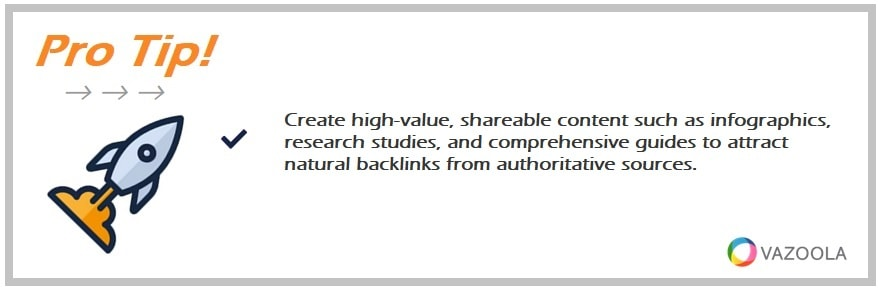
Conduct regular backlink audits to identify and disavow harmful links that could negatively impact your SEO, ensuring your backlink profile remains clean and authoritative.
Mistake 6: Over-Optimizing Anchor Text
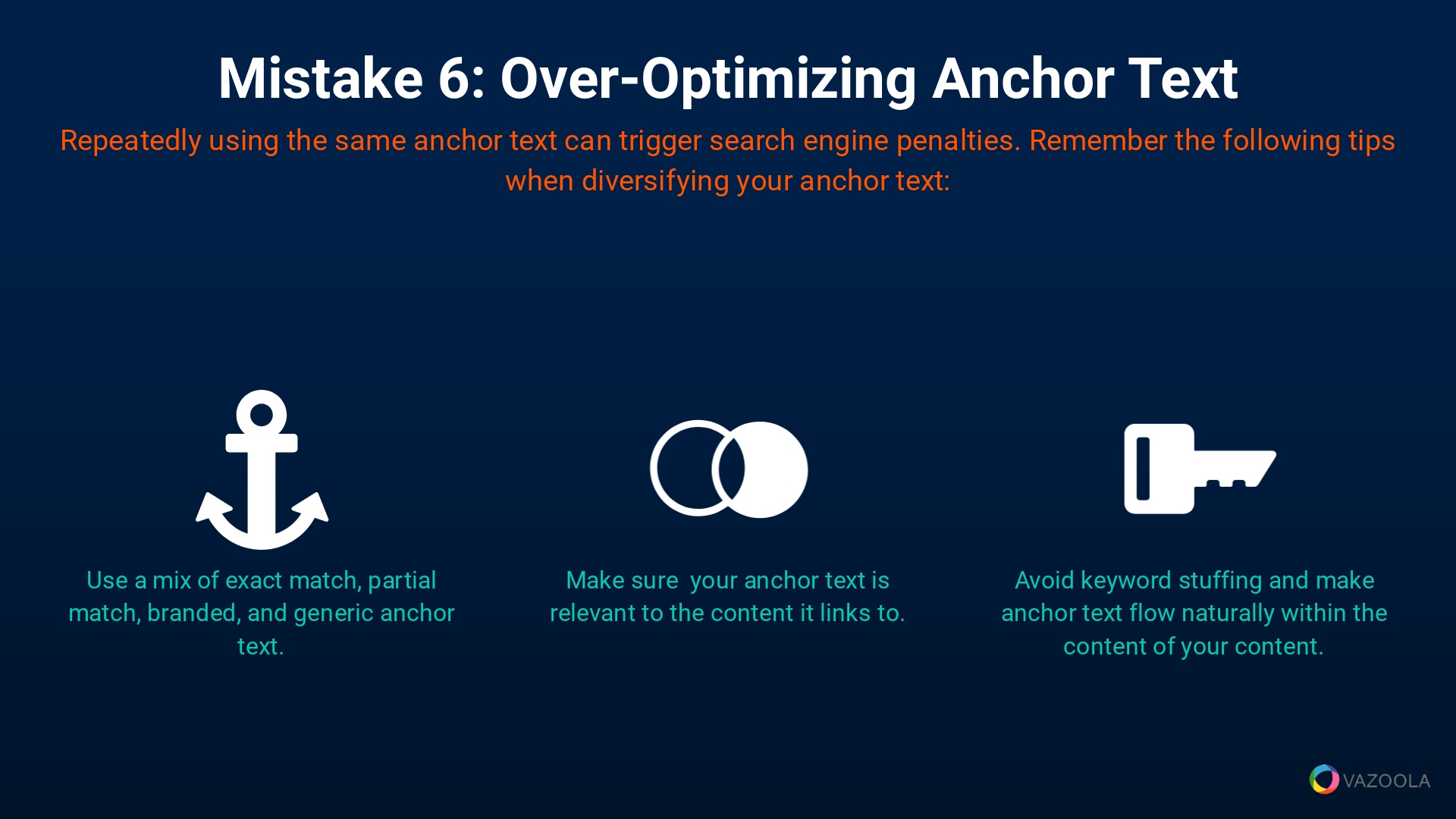
Anchor text is the clickable text in a hyperlink. Repeatedly using the same anchor text – known as over-optimized anchor text – can trigger search engine penalties.
Why do search engines care about repeated anchor text? It looks unnatural, and it can be seen as an attempt to manipulate rankings.
Instead, use a variety of anchor text that includes keywords, brand names, and natural phrases.
Remember the following tips when diversifying your anchor text for backlinks:
-
Use a mix of exact match, partial match, branded, and generic anchor text.
-
Make sure your anchor text is relevant to the content it links to.
-
Avoid keyword stuffing and make anchor text flow naturally within the content of your content.
Pro Tips:
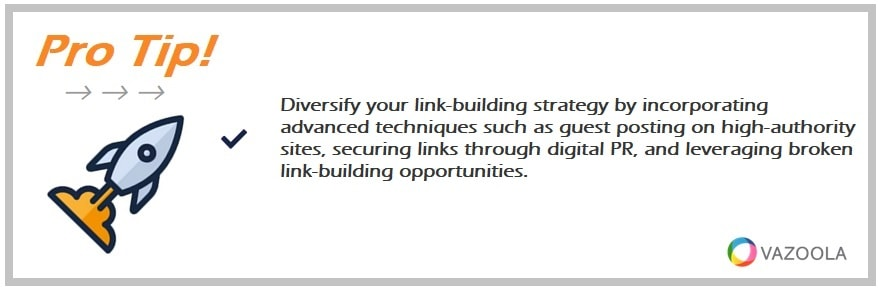
Diversify your link-building strategy by incorporating advanced techniques such as guest posting on high-authority sites, securing links through digital PR, and leveraging broken link-building opportunities.
Mistake 7: Neglecting Internal Linking
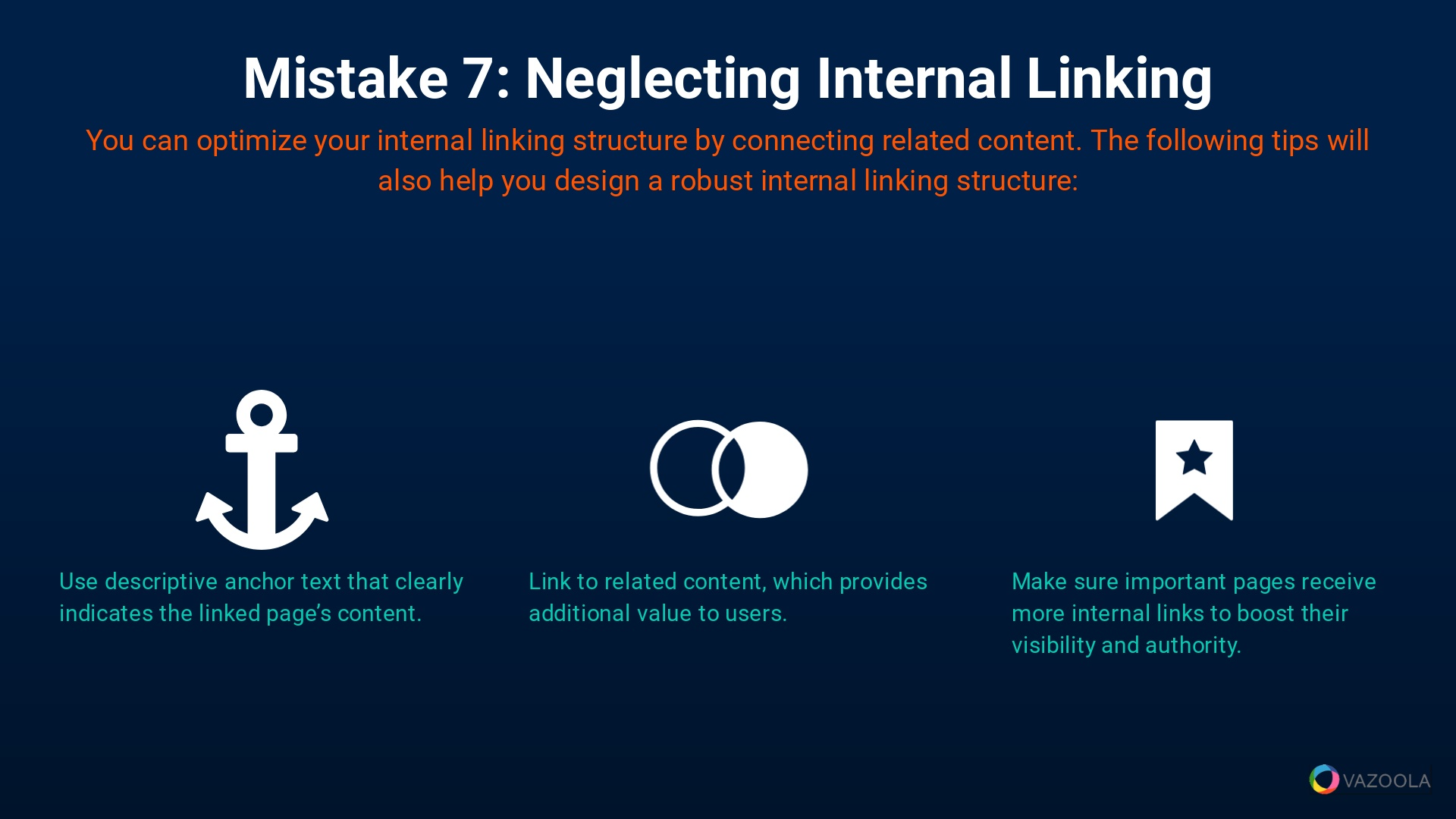
An often-overlooked aspect of SEO, internal linking can significantly impact your site's performance, The strategy helps distribute link equity throughout your site, and it improves user navigation.
What are internal links?
Internal links are hyperlinks that point to other pages within the same website. These links help search engines understand your site’s structure and hierarchy as they discover and index your content.
Internal links also improve user experience by making it easier for visitors to navigate your site.
You can optimize your internal linking structure by connecting related content, thereby enhancing SEO and providing a better user experience. The following tips will also help you design a robust internal linking structure:
-
Use descriptive anchor text that clearly indicates the linked page’s content.
-
Link to related content, which provides additional value to users.
-
Make sure important pages receive more internal links to boost their visibility and authority.
Boost Your SEO By Avoiding the Most Common Link-building Mistakes
Avoiding common link-building mistakes is a surefire way to boost your SEO efforts. Prioritize quality over quantity, use ethical tactics, and ensure your links are relevant and natural.
By steering clear of bad link building, you should build a robust backlink profile that supports long-term SEO success. A few high-quality, relevant links are more valuable than a large quantity of low-quality ones.
Make sure your link-building strategies are ethical and effective for sustained success.
Effective link building requires a strategic approach that focuses on quality, relevance, and ethical practices. Avoid the pitfalls of spammy tactics, over-optimization, and reliance on third-party metrics alone.
By adhering to these best practices, you can enhance your website's authority, improve search rankings, and drive organic traffic.
Remember, a strong link-building strategy is a marathon, not a sprint, and the rewards of a well-executed campaign are worth the effort.
Pro Tips:
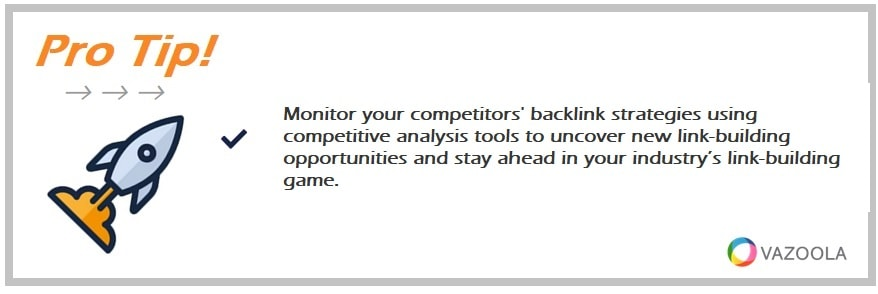
Monitor your competitors' backlink strategies using competitive analysis tools to uncover new link-building opportunities and stay ahead in your industry’s link-building game.

